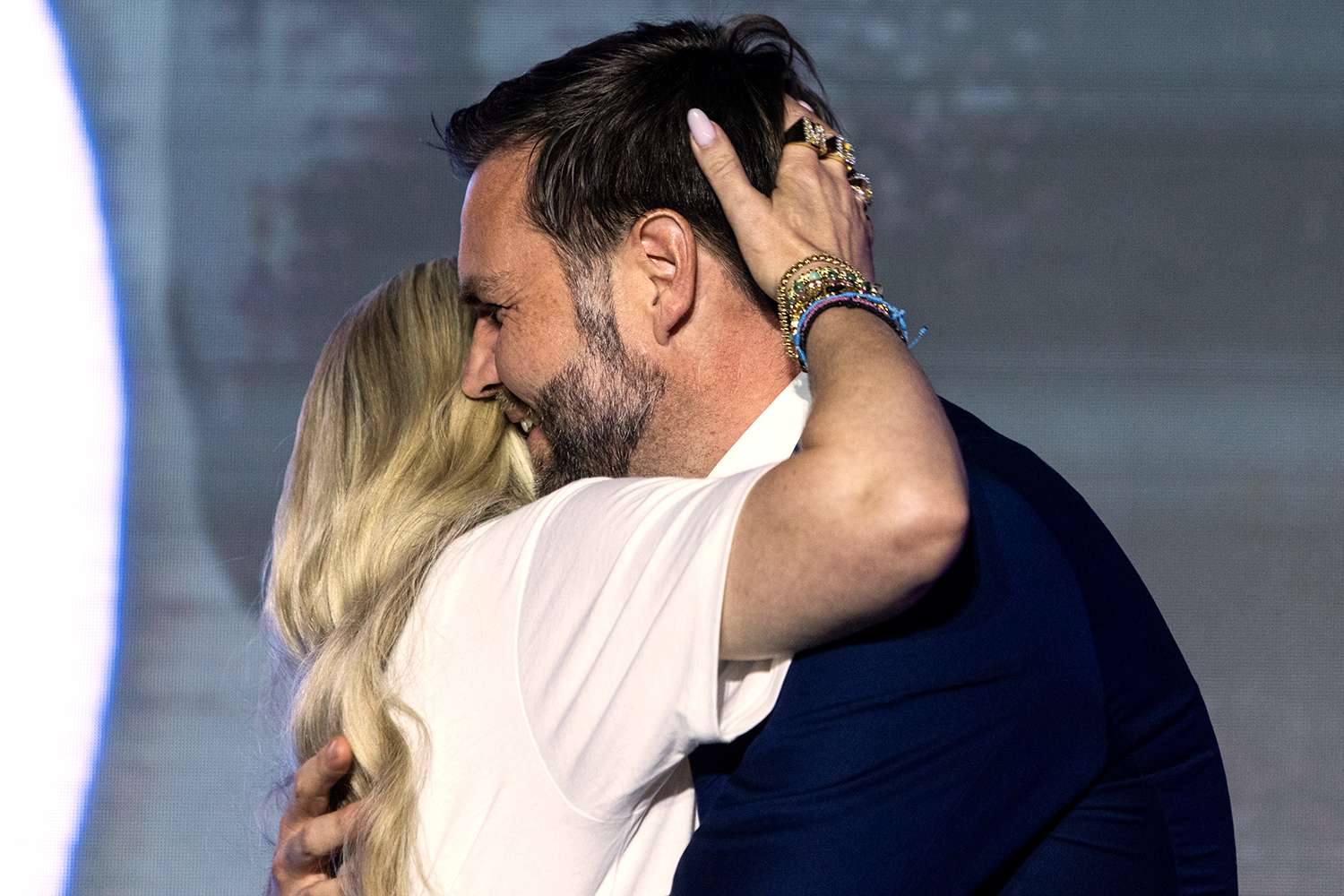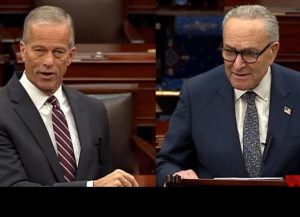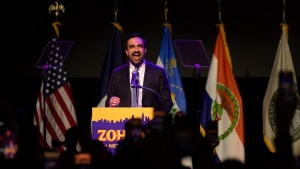Erika Kirk and Vice President J.D. Vance’s Embrace Sparks Emotional and Political Debate
When Erika Kirk took the stage at the University of Mississippi, the atmosphere was electric — charged with grief, hope, and symbolism. It was her first major public appearance since being named the new CEO of Turning Point USA, following the tragic loss of her husband, conservative leader Charlie Kirk.
The event was meant to celebrate continuity and courage — the beginning of a new chapter for both Erika and the organisation. But a single moment during that evening would soon eclipse every speech, headline, and applause: her emotional embrace with Vice President J.D. Vance.

A Turning Point for Turning Point USA
At just 36, Erika Kirk has found herself balancing unimaginable personal loss with an enormous professional responsibility. Charlie Kirk’s death in September had left both a personal and political void in one of the most influential conservative movements in the United States.
:max_bytes(150000):strip_icc():focal(749x0:751x2)/JD-Vance-Erika-Kirk-169-103125-19dcf7c725a843c49d51e3437f50f353.jpg)
Her appearance at the university event marked her official step into leadership — and her determination to continue the mission her husband built from the ground up. Taking a deep breath, Erika began her remarks by thanking supporters and acknowledging how emotional the occasion was.
“When our team asked my dear friend, Vice President Vance, to speak today, I really prayed on it,” she said, her voice trembling slightly. “Because obviously it’s a very emotional day.”
Then she paused, smiling faintly as though hearing something unspoken. “I could just hear Charlie in my heart. I could hear him say, ‘Go reclaim that territory, babe. Go. The battle’s already won. Love conquers.’”
As the crowd grew still, she continued, “No one will ever replace my husband, but I do see some similarities between him and Vice President Vance. And that’s why I am so honoured to introduce him tonight.”
The Hug That Stopped the Room

When Vance walked onstage, Erika stepped forward to greet him. What followed seemed ordinary at first — a warm embrace between colleagues. But the hug lasted longer than expected. It became still, emotional, even intimate in its intensity.
To some, it was a moment of compassion — a friend comforting a grieving widow. To others, it appeared unusually personal for a political stage. Within hours, photos and videos of the embrace began circulating across social media, sparking a wave of speculation, debate, and commentary.
Observers dissected every gesture — the way Vance’s hands briefly rested on Erika’s waist, the way her fingers seemed to brush through his hair. The moment went viral almost instantly, with countless viewers trying to interpret what the hug “really meant.”
A Wave of Public Reaction
As the video gained traction, reactions split sharply. Supporters of both figures defended the embrace as a display of empathy and solidarity. “It was raw, human, and real,” one online commentator wrote. “You could feel her pain and his support.”
Critics, however, questioned whether the public display was appropriate given the formal setting and the personal remarks that preceded it. Some said the hug blurred the lines between grief and politics — a moment too intimate for the stage.
The divide was immediate and intense. But as the online debate grew, new details began to emerge about what had happened before and after the moment that went viral.
What Was Really Said
Behind the scenes, before stepping onto the stage, Erika reportedly told her assistant she wasn’t sure she could go through with the speech. “I can’t do this. I don’t want to do it. Give me a second,” she said, taking a few moments to collect herself.
By the time she took the microphone, her composure had returned — but barely. When Vance approached her afterward, witnesses noted that he whispered something as they embraced. According to those close to the event, his words were simple: “I’m proud of you.”
Erika, still trembling, allegedly replied: “It’s not gonna bring him back.”
The exchange reframed the entire moment for many. What had seemed to some like inappropriate closeness now appeared as something else entirely — two people caught in a moment of shared grief, exhaustion, and humanity.
Between Politics and Personal Pain
To understand the weight of that hug, one has to understand the journey Erika Kirk has endured. Losing her husband in such a public and shocking way placed her under relentless scrutiny. Her decision to continue his work was both an act of resilience and a statement of purpose — but it also meant stepping directly into the spotlight he once occupied.
The emotional intensity of that decision was magnified at the University of Mississippi event. It was not just another political rally — it was the symbolic handover of a legacy.
Vance’s presence as guest of honour underlined that symbolism. As one of the most prominent figures in national politics, his appearance beside Erika signified the continued connection between Turning Point USA and the broader conservative movement.
Their embrace, in that context, wasn’t merely personal — it was also political theatre, an image of unity and defiance against the hardship that had shaken the movement.
A Moment Frozen in Time
In the hours that followed, professional analysts and commentators began offering their interpretations. Behavioural experts suggested that Erika’s actions reflected “grief body language” — a human instinct for connection and reassurance. Others pointed out that the prolonged nature of the hug and Vance’s body posture could be seen as a subconscious mirroring gesture, a way of anchoring emotional presence.
Whether interpreted as sympathy, support, or symbolism, one thing was clear: the embrace struck a chord far beyond the walls of the university.
Erika Kirk Speaks Out
Amid the viral attention, Erika eventually broke her silence. She didn’t directly address the hug itself, but instead reflected on the ongoing scrutiny she and her family had faced since her husband’s death.
“There were cameras all over my husband when he was taken from us,” she said in a recent interview. “There have been cameras all over my friends and family mourning. There have been cameras all over me — analysing my every move, my every smile, my every tear.”
Her message was unmistakable: she was tired of being a headline. “We deserve a little grace,” she said simply.
A Symbol of Continuity and Strength
For Turning Point USA, Erika’s leadership marks both a continuity of vision and the beginning of transformation. Her decision to continue Charlie Kirk’s work demonstrates commitment to his ideals while signalling a softer, more personal tone.
The embrace with Vance, while controversial, served as an unintended symbol of that duality — the merging of political mission and human vulnerability.
To supporters, Erika Kirk’s story represents strength in the face of tragedy. To critics, it highlights the blurred lines between emotion and optics in modern politics. But regardless of interpretation, one undeniable truth remains: the moment captured something deeply human — the collision between public duty and private grief.
The Legacy Ahead
As Erika Kirk continues leading one of the most visible conservative organisations in the country, every move she makes will likely be watched, analysed, and debated. But if her words at the event were any indication, she intends to focus not on the noise but on the mission: to continue the work her husband started and to do so with conviction.
“Charlie built something extraordinary,” she said that night. “And now, it’s my turn to protect it — not for me, but for the future he believed in.”
It was a powerful message — and perhaps the real takeaway from the viral moment. Beyond the headlines, beyond the cameras, and beyond the speculation, what the world saw on that stage was a woman stepping into her destiny, bearing both her heartbreak and her hope in front of millions.
The embrace between Erika Kirk and J.D. Vance was not just a headline — it was a snapshot of history: one leader grieving, another standing beside her, and a movement caught between loss and rebirth.
Whatever people choose to believe about that moment, it will likely remain one of the most unforgettable and human scenes in American political life this year — a reminder that even in politics, vulnerability can sometimes speak louder than words.

Emily Johnson is a critically acclaimed essayist and novelist known for her thought-provoking works centered on feminism, women’s rights, and modern relationships. Born and raised in Portland, Oregon, Emily grew up with a deep love of books, often spending her afternoons at her local library. She went on to study literature and gender studies at UCLA, where she became deeply involved in activism and began publishing essays in campus journals. Her debut essay collection, Voices Unbound, struck a chord with readers nationwide for its fearless exploration of gender dynamics, identity, and the challenges faced by women in contemporary society. Emily later transitioned into fiction, writing novels that balance compelling storytelling with social commentary. Her protagonists are often strong, multidimensional women navigating love, ambition, and the struggles of everyday life, making her a favorite among readers who crave authentic, relatable narratives. Critics praise her ability to merge personal intimacy with universal themes. Off the page, Emily is an advocate for women in publishing, leading workshops that encourage young female writers to embrace their voices. She lives in Seattle with her partner and two rescue cats, where she continues to write, teach, and inspire a new generation of storytellers.









